Ideas for activities
To have bigger impact with the Action Week and also help with organising, it is advised to have strong cooperation with universities and other student organisations (speciality societies, ESN etc). They can also come up with ideas for activities best fit to your community.
1. Thematic Days
2. Photo action, competition, exhibition
3. Quizzes
4. Trade fairs
5. Panel discussions, debates
6. Discussion rounds in Open Space Technology
7. Discussion clubs
8. Education information desk
9. Support research information
10. Outdoor learning
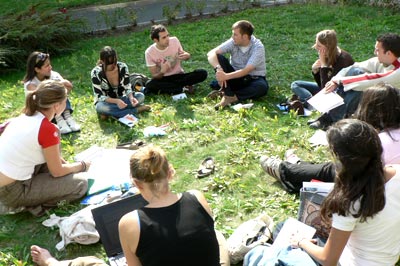
Every day within the Action Week can carry specific theme and focus on opportunities, information, problems on that subject. For example:
- Day of Interesting Study Methods:
- information about methods of non-formal education you can get from YnterACT:
www.ynteract.eu, ynteract_with_us@yahoo.com
- information about methods of non-formal education you can get from YnterACT:
- Student Exchange Day – introducing programmes like Erasmus, Leonardo, etc
- ask university exchange office to help you find students who have studied abroad and invite them to share their experiences.
2. Photo action, competition, exhibition
Visual information often achieves more than written one. In the age of digital cameras it’s not hard to start a photo action in the beginning of week, collect them in the middle, select best ones and open exhibition in the end. It could also give nice frames to the whole week. Another possibility is have long competition period before the Action Week and only open exhibition during that time.
Possible topics: “The role of non-formal education”, “Interactive learning”, “What youth organisations have taught me” etc.
Here keep in mind, that you also need people to judge the photos and resources to print them. One option might be cooperating with university newspaper, and publish the photos there instead.
Analogically to Jeopardy, Millionaire or other famous quizzes, they can also be organised within the Action Week, concentrating on thematic subjects like mobility programs, non-formal education, Bologna Process etc. The participants can be selected as certain amount from every faculty/university or with open registration, involving, if possible, also teaching staff and university stakeholders. Special rounds can also be about specialities in different faculties/universities to get become more aware of the subjects being taught. To give motivation, try to do some fundraising for a nice award for the winner(s). Maybe mayor of the town or rector of the university will agree to have dinner with them :)
To give overview about different possibilities to be involved in non-formal education, local student NGOs/NGOs dealing with education can be gathered in one building, everyone a room or “box” to introduce themselves, have workshops and time for presentation about their activities. Lectures, debates, movie sessions can also be added.
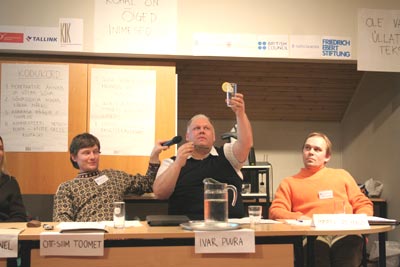
To discuss and find answer to one certain problem or question, representatives of different parties can be asked to come together, each of them with certain point of view that they present in the beginning of discussion and then debate on them. If the subject is selected wisely, it’s good way to get media attention to the Action Week.
6. Discussion rounds in Open Space Technology
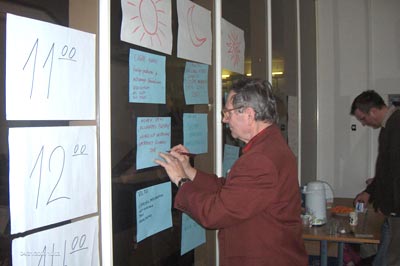
Open Space Technology was created by Harrison Owen in the 1980s as an alternative way to get different people to generate ideas and solve problems about the matters that are important to them all.
In Open Space, people who come together create the discussion groups themselves at the spot and lead them as well. It gives the opportunity to everybody to speak about things they want to seek solutions in a more informal way.
Open Space can be used, for example gathering together students and teaching staff at your faculty in order to find better cooperation between each other. Of course that also assumes open-minded participants.
More information about Open Space: http://www.openspaceworld.org/ (in 18 languages).
How Open Space has worked out in reality, read from “True stories”.
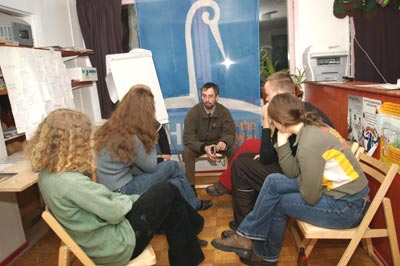
Groups of students discussing about different aspects of education, defining “Ideal Education”, brainstorming how to get there, presenting the results to each other, involving experts to explain the background and give feedback etc. This can also be organised in a “science café”-style: every day during the week (and afterwards once week or in 2 weeks) gathering in one café to have the discussions, maybe even involving random people present there.
Here would be good idea to assign discussion moderator/facilitator, who could hold
the talk in frames and on track.
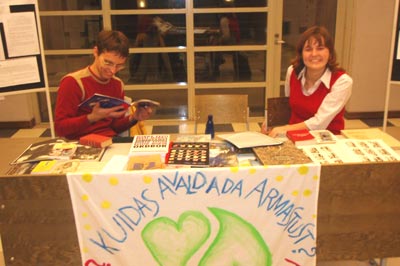
During the whole week you could set up a desk in a popular place near your university (eg entrance of library). There you can provide students with information about the week’s activities, also distribute materials about non-formal education, lifelong learning, Bologna Process (basis for that you can find from the download-section). Letting passing students fill in questionnaires about different education-related topics is also an option – just choose the questions that you would like to have answer for.
9. Support research information
It may be hard to get university attention and cooperation, so it must be very clearly explained why discussions must be held, new methods implemented etc. For that it is good to have some examples from universities where these changes are already happening and get some arguments from stakeholders there why are they supporting it. Few simple questions sent through e-mail may get answered and provide good basis for cooperation with your own university.
Being outside of classrooms can both bring diversity into learning routine and change the relationship between students and teachers. Encourage your teachers, lecturers to make parts of their lessons outside, in a park nearby, or around university campus. Propose interactive study methods how to use outdoor environment – depending from subject sketching the objects around them, interviewing people passing by, analysing the surroundings, etc. One known method is the walk of Socrates – students are given a problem to solve, they discuss it in pairs of groups while taking 15-20 min walk outside, then come back to inside to present the outcomes and have general discussion.
In the “True stories” section you may find something to support you.
NB: If you have some more ideas, please let us know and we can add them here!

